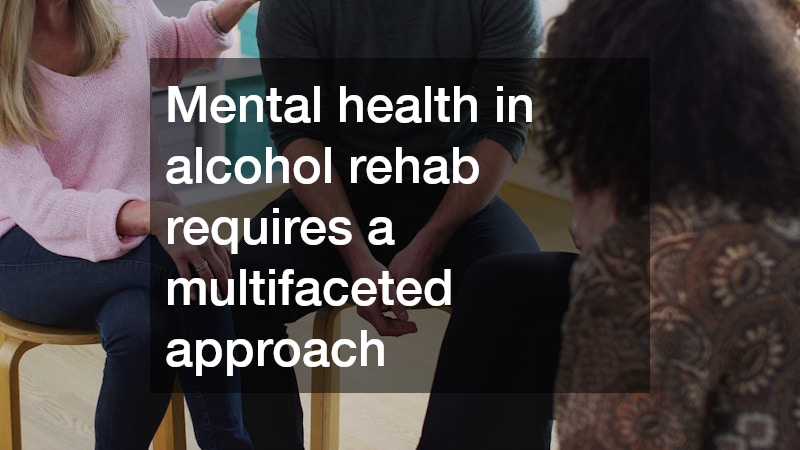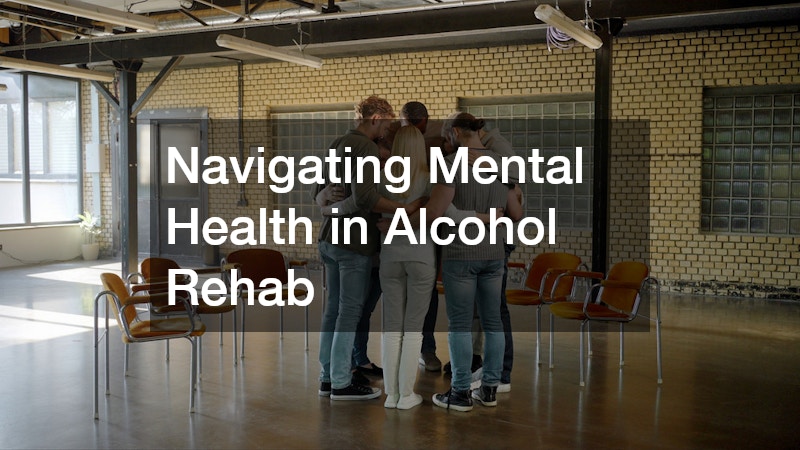Disclaimer: This website provides health information for educational purposes only and is not a substitute for professional medical advice, diagnosis, or treatment. Always seek the guidance of a qualified healthcare provider with any questions you may have.
Understanding the critical intersection of mental health and alcohol rehabilitation is essential for effective recovery. This article explores the complexities of managing mental health within the context of alcohol rehabs, addressing commonly asked questions and offering insights into successful recovery strategies.
What are the mental health challenges commonly faced in alcohol rehab?
Mood Disorders and Their Impact
Mood disorders, such as depression and anxiety, are prevalent among individuals undergoing alcohol rehabilitation and can significantly complicate the recovery process. These disorders often exacerbate feelings of hopelessness and can lead to increased alcohol cravings, creating a challenging cycle to break.
Research has shown that people with mood disorders are more likely to relapse if these conditions are not adequately addressed during rehab.
By implementing targeted therapeutic interventions, rehab centers can help individuals better manage mood disorders, ultimately supporting a more successful and sustained recovery. Addressing these conditions can significantly enhance an individual’s overall resilience and ability to cope with the challenges of sobriety.
Addressing Co-occurring Disorders
Co-occurring disorders, or dual diagnosis, present a unique challenge in alcohol rehabilitation, as individuals must navigate the complexity of treating both mental health issues and addiction. Ignoring mental health disorders while focusing solely on alcohol rehabilitation can lead to incomplete treatment and increased risk of relapse.
Effective recovery programs must incorporate comprehensive assessments to identify any co-occurring disorders early in the treatment process. By developing individualized plans that address these intertwined issues, treatment centers can enhance recovery outcomes and promote long-term sobriety. Such integrated treatment approaches show promise in increasing clients’ engagement and success in recovery.
How can therapy facilitate mental health management during rehab?
The Role of Cognitive Behavioral Therapy (CBT)
Cognitive Behavioral Therapy (CBT) plays a pivotal role in alcohol rehabilitation by helping individuals reframe negative thoughts and develop healthier responses to stressors. Through structured sessions, clients can learn to identify distorted thinking patterns that contribute to their addiction and replace them with more positive, adaptive thoughts.
Studies have shown that CBT can significantly reduce the risk of relapse post-rehab by equipping individuals with effective coping strategies. Participants often find that by altering their thought patterns, they experience improvements in emotional regulation and a reduction in anxiety and depressive symptoms. Learning to effectively manage one’s thoughts and behaviors can empower individuals to take control of their recovery journey.
Integrating Holistic Therapies
Integrating holistic therapies such as mindfulness and art therapy into alcohol rehab facilitates deeper mental health management and overall healing. These therapies support the processing of emotions and stress, which can often feel overwhelming during the recovery process.
Mindfulness practices teach individuals to remain present, reducing rumination and reactivity to cravings or emotional triggers. Art therapy offers a creative outlet for expressing emotions, promoting self-discovery and catharsis that verbal language sometimes cannot convey. These methods, when combined with traditional treatments, offer a comprehensive approach to addressing recovery challenges.
What coping strategies are effective for maintaining mental health post-rehab?
Building a Supportive Network
Building a supportive network is critical for maintaining mental health following alcohol rehab, as supportive relationships can provide invaluable encouragement and accountability. Friends, family, and support groups all contribute to creating an environment where individuals feel understood and motivated.
Participation in peer support groups, such as Alcoholics Anonymous or similar programs, offers a community of individuals who share similar experiences and challenges. These connections enable individuals to share coping strategies, learn from others’ successes, and foster a sense of belonging and acceptance. Professional expertise paired with the support from loved ones can help reinforce the commitment to sobriety and mental well-being.
Developing Resilience and Life Skills
Developing resilience and essential life skills is key to managing stress and preventing relapse after alcohol rehab. Resilience enables individuals to navigate the inevitable challenges of life without resorting to harmful coping mechanisms.
Rehabilitation programs often focus on teaching practical skills such as effective communication, stress management techniques, and emotional regulation strategies. These tools empower individuals to handle life’s pressures and build a stable, sober lifestyle outside of rehab. Building resilience ultimately supports enduring recovery by enhancing one’s ability to adapt to new situations and overcome obstacles.
Navigating mental health in alcohol rehab requires a multifaceted approach that addresses both psychological and emotional needs. By understanding the challenges and integrating comprehensive treatment strategies, individuals can achieve a sustainable recovery and improved overall well-being.
.





